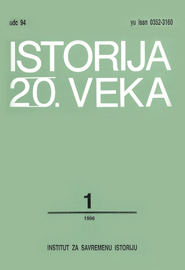JUGOSLAVIJA 1918-1991. - PORAZ JEDNOG IDENTITETA I JEDNE NESTABILNE POLITIČKE KULTURE
YUGOSLAVIA 1918-1991. - THE DEFEAT OF AN IDENTITY AND OF AN UNSTABLE POLITICAL CULTURE
Author(s): Stevan K. PavlovićSubject(s): Political history, Recent History (1900 till today), Nationalism Studies, Inter-Ethnic Relations, Politics and Identity, Wars in Jugoslavia
Published by: Institut za savremenu istoriju, Beograd
Keywords: Yugoslavia; 20th century; identity; politics; political culture; ideology; Serbia; Croatia; communists;
Summary/Abstract: A critical analysis of the Yugoslav political culture during the existence of the state of South Slavs shows serious limitations and the absence of a generally accepted identity which could help surmount the differences between people and territories. Together this led to the breakdown of the country. Yugoslavia was formed by various factors - the idea of uniting related ethnic groups, the victory of the Serbian army, the breakdown of Austria-Hungary and the political need for a quick unification. One of the main causes of dissention in both Yugoslavias, besides different Serbian and Croatian political traditions, was the national issue. In the second Yugoslavia, the communists used the national issue as a means of grasping and keeping power in their hands, while federalism was only a facade for the underlying ideology of Unitarian rule. This system resulted in the rise of regional elites which, being unable to solve complex economic problems, activated national differences. Unifying factors, apart from the official ideology or the fear of external danger, were nonexistent. Yugoslavia broke down over the same principle on which it was once formed - the people’s right of choice.
Journal: Istorija 20. veka
- Issue Year: 1996
- Issue No: 1
- Page Range: 7-20
- Page Count: 14
- Language: Serbian

